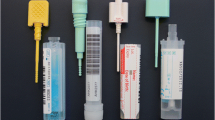Summary
Background
There are several screening tools for colorectal cancer (CRC). Most are limited in their application. The fecal occult blood test (FOBT) is a first-step screen for CRC that is limited by low sensitivity. This study aimed to prove the efficacy of combined FOBT and fecal carcinoembryogenic antigen (fCEA) as a CRC screening test.
Methods
Stool samples were collected preoperatively from 166 CRC patients expected to undergo elective surgery and from normal control patients. A fecal CEA/FOBT dual kit was created and the results from the use of this dual kit were compared against other clinicopathologic parameters.
Results
FOBT was positive in 103 of the 166 (62.0%) CRC patients and fCEA was positive in 114 (68.7%) patients, showing a statistically positive relationship. Among 63 FOBT negative patients, 29 (17%) cases were CEA positive. Thus, the CEA/FOBT dual test could detect CRC in 79.5% of the patients (132/166). The sensitivity and specificity of the dual FOBT/CEA test was 79.5% and 97.9%, respectively.
Conclusions
The FOBT/CEA dual test has increased sensitivity compared to the FOBT test and may have merit as a screening device for colorectal cancer. Population-based studies are required to confirm this potential.

Similar content being viewed by others
References
Haug U, Knudsen AB, Brenner H, Kuntz KM. Is fecal occult blood testing more sensitive for left- versus right-sided colorectal neoplasia? A systematic literature review. Expert Rev Mol Diagn. 2011;11(6):605–16.
Jung KW, Won YJ, Kong HJ, Oh CM, Shin A, Lee JS. Survival of Korean adult cancer patients by stage at diagnosis, 2006–2010: national cancer registry study. Cancer Res Treat. 2013;45(3):162–71.
Jung KW, Won YJ, Kong HJ, Oh CM, Seo HG, Lee JS. Prediction of cancer incidence and mortality in Korea, 2013. Cancer Res Treat. 2013;45(1):15–21.
Shin A, Choi KS, Jun JK, Noh DK, Suh M, Jung KW, et al. Validity of fecal occult blood test in the national cancer screening program, Korea. PLOS ONE. 2013;8(11):e79292.
Jin P, Wu ZT, Li SR, Li SJ, Wang JH, Wang ZH, et al. Colorectal cancer screening with fecal occult blood test: a 22-year cohort study. Oncol Lett. 2013;6(2):576–82.
Holme O, Bretthauer M, Fretheim A, Odgaard-Jensen J, Hoff G. Flexible sigmoidoscopy versus faecal occult blood testing for colorectal cancer screening in asymptomatic individuals. Cochrane Database Syst Rev. 2013; doi:10.1002/14651858.cd009259.pub2.
US Preventive Services Task Force Guides to Clinical Preventive Services. The guide to clinical preventive services 2012: recommendations of the US preventive services task force. Rockville: Agency for Healthcare Research and Quality; 2012.
Kim Y, Lee S, Park S, Jeon H, Lee W, Kim JK, et al. Gastrointestinal tract cancer screening using fecal carcinoembryonic antigen. Ann Clin Lab Sci. 2003;33(1):32–8.
Hewitson P, Glasziou P, Irwig L, Towler B, Watson E. Screening for colorectal cancer using the faecal occult blood test, Hemoccult. Cochrane Database Syst Rev. 2007; doi:10.1002/14651858.cd001216.pub2.
Hol L, van Leerdam ME, van Ballegooijen M, van Vuuren AJ, van Dekken H, Reijerink JC, et al. Screening for colorectal cancer: randomised trial comparing guaiac-based and immunochemical faecal occult blood testing and flexible sigmoidoscopy. Gut. 2010;59(1):62–8.
Lepage C. Immunochemical faecal occult blood tests for colorectal cancer screening: no time to lose. Dig Liver Dis. 2014;46:30. doi:10.1016/j.dld.2013.10.001.
Sobhani I, Alzahouri K, Ghout I, Charles DJ, Durand-Zaleski I. Cost-effectiveness of mass screening for colorectal cancer: choice of fecal occult blood test and screening strategy. Dis Colon Rectum. 2011;54(7):876–86.
Hundt S, Haug U, Brenner H. Blood markers for early detection of colorectal cancer: a systematic review. Cancer Epidemiol Biomarkers Prev. 2007;16(10):1935–53.
Wild N, Andres H, Rollinger W, Krause F, Dilba P, Tacke M, et al. A combination of serum markers for the early detection of colorectal cancer. Clin Cancer Res. 2010;16(24):6111–21.
Kim YC, Kim JH, Cheung DY, Kim TH, Jun EJ, Oh JW, et al. The usefulness of a novel screening kit for colorectal cancer using the immunochromatographic fecal tumor M2 pyruvate kinase test. Gut Liver. 2015;9(5):641–8.
Tonus C, Sellinger M, Koss K, Neupert G. Faecal pyruvate kinase isoenzyme type M2 for colorectal cancer screening: a meta-analysis. World J Gastroenterol. 2012;18(30):4004–11.
Acknowledgements
This work was partially supported by the Technology Innovation Program (No: 10049771, Development of Highly-Specialized Platform for IVD Medical Devices) funded by the Ministry of Trade, Industry & Energy (MI, Korea).
Author information
Authors and Affiliations
Corresponding author
Ethics declarations
Conflict of interest
M. Kim, H.-J. Kim, In Kyu Lee, S.-T. Oh, and K. Han declare that they have no competing interests.
Additional information
This study was written as a graduate thesis.
Rights and permissions
About this article
Cite this article
Kim, M., Kim, HJ., Lee, I.K. et al. Fecal occult blood test/fecal carcinoembriogenic antigen dual rapid test as a useful tool for colorectal cancer screening. Eur Surg 49, 127–131 (2017). https://doi.org/10.1007/s10353-017-0464-2
Received:
Accepted:
Published:
Issue Date:
DOI: https://doi.org/10.1007/s10353-017-0464-2



